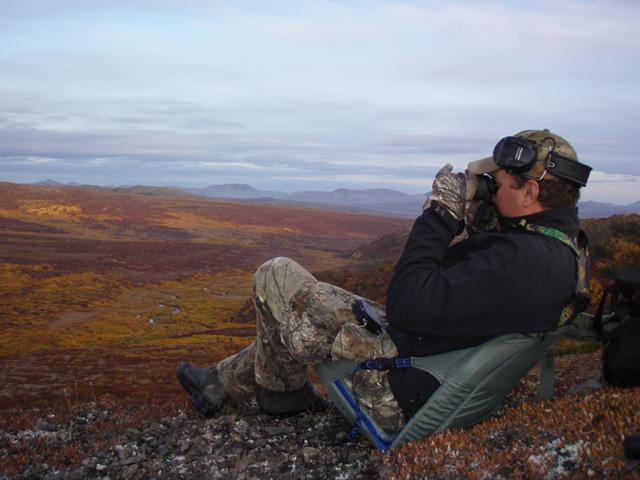13th September
I slept so well on my hard camp bed that John could hardly wake me up. He had to come right into my tent to do it. But the 6.00am wake-up call, usually so convenient for a hunter, was pointless today. There's fog everywhere, and we can't see further than 300ft. So we aren't going anywhere, and instead will spend the time in John's tent enjoying a generous breakfast. His quarters form the kitchen and dining room as well, with his bed serving as a bench. I eat from a disposable paper plate, which has been designated as mine. At each meal I try to eat from the side which is least dirty. Today's breakfast continues where yesterday's dinner left off. So far, I've drunk cocoa and water, in that order, both from the same glass. It is surprisingly practical as the water helps to wash off the dried cocoa on the glass, and I wasn't bothered by the fact the water had a slight taste of cocoa to it.
This are normal occurrences in the life of any camp.
John makes excellent scrambled eggs with fried bacon, and after that I eat a whole packet of biscuits; so at least I won't have to worry about storing them.



Chapter VI.: Return to Alaska
Page 19
We look to see if the fog has lifted. We walk about 100ft. behind the camp to see what's happening. But there's not much to see if you don't like fog. We soon return; at least it's warm in the sleeping bag, and we can see nearly as much from inside the tent as we can from outside.
We spend most of the morning dozing and thinking (I choose to doze rather than think: it's less exhausting).
I wake up around 11.00, and when I look out there's no trace of fog. I call John, we slowly pack our rucksacks, and then set out to do some bear spotting. I was told yesterday that the secret of bear hunting is patience. 90% of hunting is nothing but waiting. You have to strike a balance between trekking and using the binoculars, the latter having the larger role. A lot of walking around leaves too much scent on the ground, and every bear will run a mile. John says a grizzly can pick up human scent even after 2-3 days, and will take flight at once. There will be no chance of bagging that bear that year. Whereas a moose will quickly forget the scent and possibly return to the area, a bear never will.
They are too clever for that.


Chapter VI.: Return to Alaska
Page 20
We walk for about a mile, stopping occasionally, until we reach the top of a neighboring hill. Huge vistas roll out before us, valleys running off in every direction. Now begins the endless searching through the binoculars. For the first hour the Swarov never leaves my eyes, but then I decide to lie back comfortably on the 1ft. deep bed of moss and watch the landscape with my bare eyes.
The beautiful, untamed, untouched, ancient Alaskan wilderness.
There are no roads here. No cities, no forestry, and nothing to be seen made by human hand, or any artificial influence. The land has looked like this for thousands of years. The colors are bright and varied. I've noticed a copse, made up of a few tiny trees, in front of some gray rocks, which is so yellow that it seems to be ablaze in the sunlight. I can also see flame-red bushes and ivy-green moss. There's no transition between the colors; all the different types of plants are sharply delineated. The small valleys are broken by hills and mountains, and crystal streams criss-cross the landscape. And there, on the banks of one of the brooks, between two lonely, towering pines… a huge body is moving!
GRIZZLY!
I alert John, who's on the other side of the hill; he looks in the same direction through his spotting scope, and then rolls towards me. I point out the two trees and he tells me to get my gun ready.
While I'm fishing about for it he gets his out, while still managing to keep watch with the spotting scope. The bear goes behind an elevation… we lose sight of it.
There are two possibilities, says my guide. The first is that it will carry straight on in the same direction. If that happens we won't ever see it again. The second is that it will climb up the hill to start nibbling on the blueberries - a treat for any grizzly. And then we'll get it.
We stare fixedly at the place it disappeared, and the blueberry bushes on the hill. We wait for over 30mins. but it doesn't come back. Unfortunately, it has run off. I measure the distance with my laser: it was 250ft. away when I spotted it. There's no point in chasing it: a grizzly can move very fast.
We relax, the excitment is over, and we each return to watching our allotted area.
That is how the day passed.
We keep watching for another bear for nearly eight hours. Almost always in the same place. No-one can accuse me of impatience. We don't need to move as we have a good view of everything.
When we get home, we sit on the look-out, beneath the camp, and kill two more hours there. It is past 9.00pm when we finally get back to camp.
We've seen nothing apart from caribou. They know they don't have to worry about us. I could have shot as many as I wanted.


Chapter VI.: Return to Alaska
Page 21
Bearhunting Spike Camp










